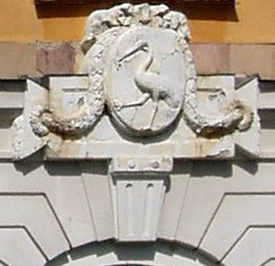Grill (family)

The Grill family coat of arms at the Österbybruk manor
|
|
| Ethnicity | Swedish |
|---|---|
| Place of origin | Genoa, Italy |
| Members |
|
| Distinctions | Prominent in trade, manufacturing and politics |
| Estate | Numerous during the 18th century and 19th century |
| Motto: Honesty is the best policy. | |
The Grill family was one of several Swedish families having significant influence with the Swedish East India Company (SOIC). During the 17th century, 18th century and for some years into the 19th century, they owned ironworks and mills manufacturing goods for export while operating wharfs, textile companies, saw mills and other factories related to shipbuilding. Several Grills were directors of the SOIC and the Grill firm traded with the merchants in Canton (now known as Guangzhou) as members of the SOIC and privately. The Grills owned houses, manors and estates at a number of locations in Sweden.
All the noted Grills were in some way connected to the main Grill Trading House, and several other companies were established in association with the Trading House. The Grill name was kept and passed on through the generations and some of the Grills even shared the same first name.
Apart from the SOIC, the Grills are most noted for their contribution to the Swedish iron industry and for exports of iron during the 18th century.
Originating in Genoa, Italy, part of the family moved to Augsburg, Germany where on 29 July 1571, Andreas Grill received burgher arms with their own coat of arms. from the Holy Roman Empire.
The name Grill comes from the Italian Grillo, meaning cricket, while the family's coat of arms displays a crane holding a cricket in its beak.
The family came to Sweden with the arrival of the silversmith Anthoni Grill (I), grandson of Andreas Grill, born in Augsburg and from 1638, a burgess in Amsterdam. He was the Riksguardie (National Appraiser) for the Myntverket in 1658 to 1667, where he supervised the making of coins and made sure that measurements were standardized throughout Sweden. He was not especially good at his work and in 1663, he was demoted to handle smaller goods in gold and silver. He was succeeded at the Myntverket by his son Anthoni Grill (II), who also bought the Grill house at Stortorget in Stockholm.
...
Wikipedia
